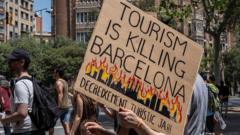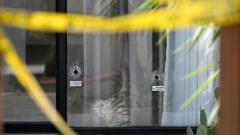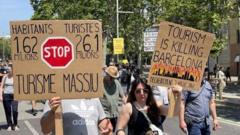"Despite the lingering effects of a recent militant attack that claimed 26 lives, Pahalgam, a renowned tourist destination in Kashmir, is slowly witnessing a cautious return of tourists. Local businesses fear long-term impacts on their livelihoods, while uncertainty and anxiety overshadow the recovery efforts."
"Kashmir's Turbulent Return to Tourism: Hope Amidst Shadows of Violence"

"Kashmir's Turbulent Return to Tourism: Hope Amidst Shadows of Violence"
"In the aftermath of a deadly attack, Pahalgam struggles to revive its tourism sector as visitors cautiously return."
Empty line 4
In the aftermath of a harrowing militant assault that left 26 people dead, the picturesque town of Pahalgam in Indian-administered Kashmir is experiencing a tentative resurgence of tourism. A week after the attack, during which armed militants targeted tourists visiting Baisaran, a scenic meadow close to Pahalgam, the streets, once desolate and quiet, are beginning to show signs of life, albeit with a sense of trepidation.
Witnesses describe the day of the attack—one of the worst in recent history—where chaos ensued as gunfire erupted, primarily affecting tourists. The attack has intensified already rising tensions between India and Pakistan, with both nations trading retaliatory threats. With tourism being a crucial part of Pahalgam’s economy, local businesses worry that this tragic incident could deter visitors for an extended period.
Tourists like Akshay Solanki from Mumbai, despite his group's fear and panic during the attack, opted to remain because return flights had become prohibitively expensive. Meanwhile, local residents have been vocal in their reassurances, urging visitors not to abandon Kashmir. Prominent figures, including Bollywood actor Atul Kulkarni, have arrived in Pahalgam to encourage tourists to maintain their plans, stating that the best response to the attackers is to visit in larger numbers.
Despite these efforts, the overarching sentiment remains one of uncertainty. Reports indicate that the cancellation rates for planned trips are alarmingly high—estimated between 80-90%—as travelers grapple with a fear of escalating conflict. Tour operators are struggling to manage the fallout, with many contemplating future bookings.
Additionally, the anticipated inauguration of a crucial infrastructural project, the world's highest single-arch rail bridge, now faces delays, overshadowing the region's potential economic revival. Local leaders and business owners express deep concern regarding the investment climate, with prospects dimming as uncertainties loom.
Kashmir’s Chief Minister, Omar Abdullah, delivered heartfelt tributes to the victims during an assembly session, expressing profound sorrow for the loss of lives. He decried the impact of the attack on both local families and the broader tourism narrative, emphasizing the deep scars left in its wake. As the region hopes for recovery, the echoes of violence continue to cast a long shadow over its tourism-dependent economy.
In the aftermath of a harrowing militant assault that left 26 people dead, the picturesque town of Pahalgam in Indian-administered Kashmir is experiencing a tentative resurgence of tourism. A week after the attack, during which armed militants targeted tourists visiting Baisaran, a scenic meadow close to Pahalgam, the streets, once desolate and quiet, are beginning to show signs of life, albeit with a sense of trepidation.
Witnesses describe the day of the attack—one of the worst in recent history—where chaos ensued as gunfire erupted, primarily affecting tourists. The attack has intensified already rising tensions between India and Pakistan, with both nations trading retaliatory threats. With tourism being a crucial part of Pahalgam’s economy, local businesses worry that this tragic incident could deter visitors for an extended period.
Tourists like Akshay Solanki from Mumbai, despite his group's fear and panic during the attack, opted to remain because return flights had become prohibitively expensive. Meanwhile, local residents have been vocal in their reassurances, urging visitors not to abandon Kashmir. Prominent figures, including Bollywood actor Atul Kulkarni, have arrived in Pahalgam to encourage tourists to maintain their plans, stating that the best response to the attackers is to visit in larger numbers.
Despite these efforts, the overarching sentiment remains one of uncertainty. Reports indicate that the cancellation rates for planned trips are alarmingly high—estimated between 80-90%—as travelers grapple with a fear of escalating conflict. Tour operators are struggling to manage the fallout, with many contemplating future bookings.
Additionally, the anticipated inauguration of a crucial infrastructural project, the world's highest single-arch rail bridge, now faces delays, overshadowing the region's potential economic revival. Local leaders and business owners express deep concern regarding the investment climate, with prospects dimming as uncertainties loom.
Kashmir’s Chief Minister, Omar Abdullah, delivered heartfelt tributes to the victims during an assembly session, expressing profound sorrow for the loss of lives. He decried the impact of the attack on both local families and the broader tourism narrative, emphasizing the deep scars left in its wake. As the region hopes for recovery, the echoes of violence continue to cast a long shadow over its tourism-dependent economy.





















